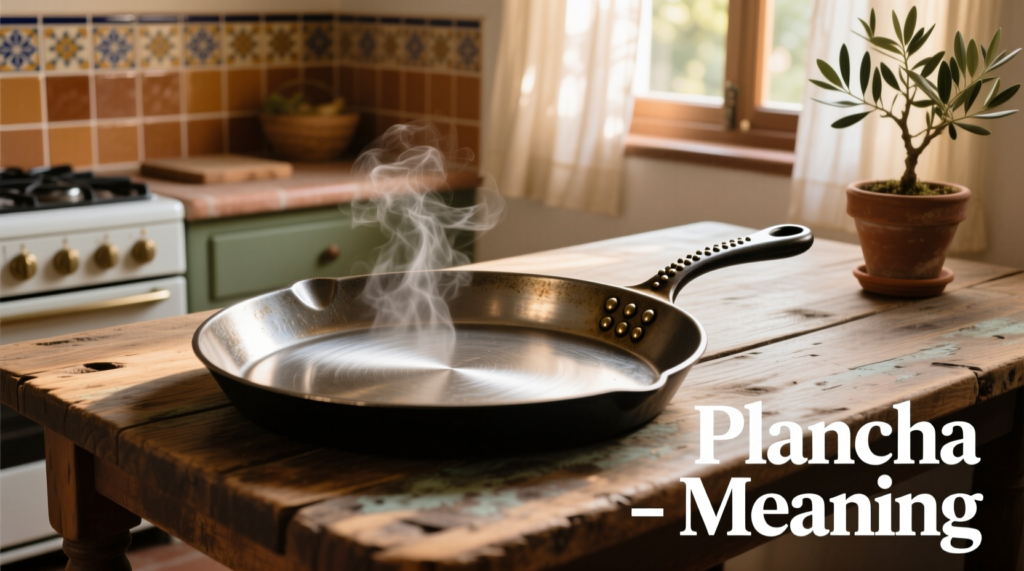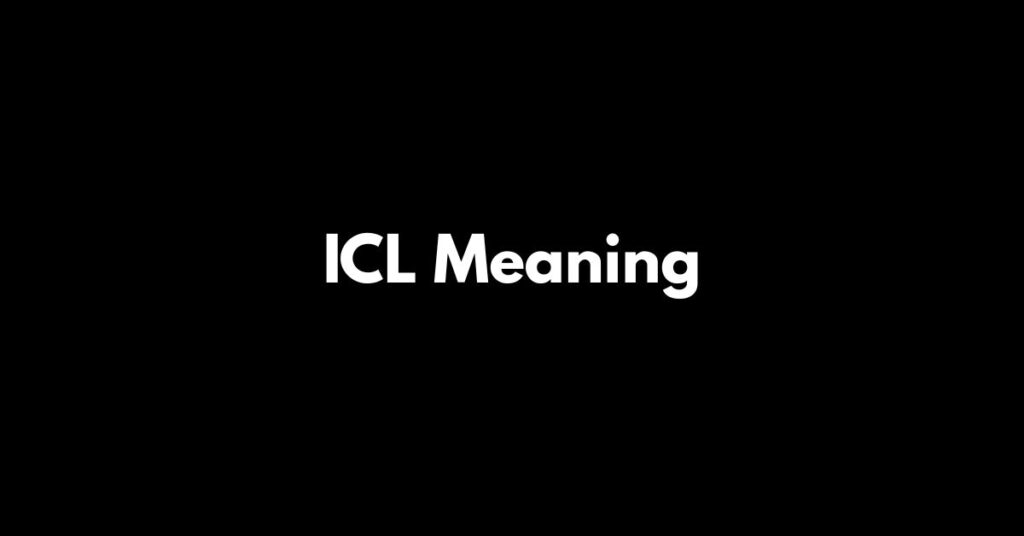Language is full of surprises. A single word can travel across cultures, pick up fresh meanings, and slip into new contexts without losing its roots. Plancha is one of those words. It looks simple, but depending on where you are—or what you’re talking about—it can mean a sizzling cooking style, a household appliance, a tough fitness move, or even a relaxed way to float on water.
In this guide, we’ll explore every shade of plancha meaning. Along the way, we’ll also dig into the word hiatus, uncover its uses in entertainment, work, and anatomy, and share practical synonyms and alternatives you can use in daily conversation.
Let’s dive into the world of borrowed words, idiomatic expressions, and the fascinating journey of how language evolves.
What Does Plancha Mean?
The word plancha comes from the Spanish language, and at its core, it means “iron plate.” Over time, its lexical choice expanded across domains—kitchens, households, gyms, and even social gatherings. That semantic flexibility explains why the same word might pop up in your favorite tapas bar menu, your laundry basket, or your workout plan.
This fluidity makes plancha a perfect example of language evolution—where a single root word finds new life in multiple contexts. Let’s break it down.
Plancha in Cooking – “A La Plancha”
Meaning in Context
In the culinary world, “a la plancha” means cooking food on a flat, heated iron plate. The technique is especially popular in Spanish and Latin cuisines, where fresh seafood, meats, or vegetables are seared quickly to lock in flavor.
Why It Matters
Cooking a la plancha is both healthy and tasty. It uses minimal oil, keeps the natural juices intact, and creates that irresistible smoky sear.
Example Use
- “We ordered calamares a la plancha with garlic and lemon.”
- “The chef served vegetables a la plancha with olive oil drizzle.”
Comparison Table: Plancha vs Grill vs Pan-Frying
| Method | Heat Source | Oil Required | Flavor Profile | Health Factor |
|---|---|---|---|---|
| A la Plancha | Flat iron plate | Minimal | Smoky, seared, clean taste | High |
| Grill | Open flame/charcoal | Low | Charred, smoky, rustic | Medium |
| Pan-Frying | Skillet on stovetop | Moderate | Rich, often heavier from oils | Lower |
This style of cooking is now crossing into cross-linguistic usage as chefs worldwide borrow the Spanish term.
Plancha as a Household Appliance – The Iron
Meaning in Context
In Spanish-speaking households, plancha often means the iron you use for clothes. This is one of the most common borrowed words that retains its original sense of “iron plate.”
Example Use
- “Necesito la plancha to smooth out my shirt.”
- “Did you leave the plancha plugged in?”
Fun Linguistic Note
Sometimes, autocorrect errors or typographical variations in bilingual texting turn “plancha” into “plank” or “plasma,” creating confusion in messaging apps. This is a good reminder of how technology influences meaning in context.
Plancha in Fitness – The Plank Exercise

Meaning in Context
In the fitness world, la plancha refers to the plank exercise—a move where you hold your body straight, supported on elbows or hands.
Benefits of “La Plancha” Exercise
- Builds core strength
- Improves posture and stability
- Strengthens shoulders and arms
- Requires no equipment
Step-by-Step Guide
- Place forearms on the ground.
- Extend your legs and balance on toes.
- Keep your back flat, hips aligned.
- Hold position while breathing steadily.
Example Use
- “Today’s workout includes three sets of plancha for 60 seconds each.”
This shows how cross-linguistic usage adapts: a Spanish word becomes a global fitness term.
Idiomatic Use – “Hacer la Plancha”
Meaning in Context
In Spain and Latin America, the phrase “hacer la plancha” is an idiomatic expression. Literally, it means to float face up in water. Figuratively, it often means to relax, lie back, or even “do nothing.”
Example Use
- “After work, I just want to hacer la plancha on the couch.”
- “At the beach, he spent the whole day haciendo la plancha in the sea.”
This idiomatic shift illustrates the contextual meaning of words—how literal actions morph into figurative speech.
Cultural & Social Uses of Plancha
Cooking a la plancha is also central to festivals and community events in Spain, Latin America, and even parts of Europe. Street vendors and families gather around large planchas, sizzling seafood or meats in the open air.
The cultural value lies in shared meals, communal dining, and the joy of simple yet flavorful cooking.
Plancha in Modern Restaurants & Gastronomy

High-end restaurants are reinventing the plancha experience. Some offer interactive dining, where customers cook their food on heated iron plates built into tables—similar to Japanese teppanyaki-style dining.
Example Menu Use
- “Tuna steak a la plancha with citrus glaze.”
- “Seasonal vegetables grilled on the plancha.”
This trend highlights how lexical choice can carry prestige in gastronomy, adding authenticity to menus.
Environmental Aspect of Plancha Cooking
Cooking a la plancha isn’t just flavorful—it’s eco-friendly.
- Less oil → healthier and reduced waste.
- Reusable iron surface → no disposable cookware.
- Efficient heat use → energy-conscious cooking.
Compared to deep frying, it’s cleaner, greener, and better aligned with sustainability efforts.
Hiatus Meaning – More Than Just a Pause
While plancha speaks of iron plates and fitness moves, hiatus comes from Latin “hiatus,” meaning “opening” or “gap.” Its word origins remind us that language borrows from history as much as from culture.
At its core, hiatus means a temporary break or interruption. But its contextual meaning shifts across domains.
Hiatus in Entertainment
When a TV show takes a mid-season break, fans often see the dreaded headline: “The series is on hiatus.” In entertainment, it simply means production has paused.
Example:
- “The podcast is on a short hiatus until next month.”
Hiatus in Work or Study
In careers or education, a hiatus could mean a sabbatical, a gap year, or a pause for personal reasons.
Example:
- “She took a year-long hiatus from teaching to travel.”
Here, tone adaptation matters. In formal settings, you might say “leave of absence.” In casual talk, “taking a break” feels more natural.
Hiatus in Anatomy
In medical science, hiatus refers to a natural opening in body structures. The esophageal hiatus, for example, is the opening in the diaphragm where the esophagus passes through.
Example:
- “A hiatal hernia occurs when the stomach bulges through the esophageal hiatus.”
This domain-specific usage shows how one word carries semantic flexibility across disciplines.
Alternatives to Saying Hiatus
Sometimes “hiatus” feels too formal or academic. Choosing the right synonym depends on formal vs casual register and your lexical choice.
Here are practical alternatives:
| Alternative | Best Context Example |
|---|---|
| Break | “I need a short break from studying.” |
| Pause | “Let’s pause the meeting for five minutes.” |
| Time off | “He’s taking some time off work.” |
| Sabbatical | “Her sabbatical gave her fresh insights.” |
| Intermission | “The play has a short intermission.” |
| Interval | “The coach called for a five-minute interval.” |
| Leave of absence | “He applied for a leave of absence.” |
| Downtime | “The website had unexpected downtime.” |
| Rest period | “Athletes need a rest period to recover.” |
| Interlude | “The song served as a calm interlude.” |
| Cooling-off period | “They agreed on a cooling-off period before negotiating.” |
“Stand For And” – Meaning in Text
Sometimes, language gets messy. The phrase “stand for and” often appears due to autocorrect errors or quick typing. It might be a typographical variation of:
- “Stand for A and D” (abbreviation context).
- “Stand for both X and Y” (dual representation).
- A miswritten form of “stand for an.”
Example Use
- “Does ‘UN’ stand for and represent multiple organizations?”
- “It looks like a typo—it should read ‘stand for an.’”
This shows how politeness strategies and careful editing matter in written communication.
Choosing the Right Word Based on Tone
When deciding between “hiatus” and its synonyms/alternatives, consider your audience.
- Formal register: “leave of absence,” “sabbatical,” “intermission.”
- Casual register: “break,” “pause,” “time off.”
Example:
- Academic paper: “The project entered a six-month hiatus.”
- Friendly chat: “I’m taking a little time off.”
This kind of tone adaptation ensures clarity and avoids sounding stiff.
Conclusion
The journey of words like plancha and hiatus reveals the beauty of language evolution. A simple iron plate becomes a cooking method, a household tool, a fitness move, and even a cultural symbol. A Latin root word grows into pauses in TV, careers, and anatomy.
Words shift, adapt, and evolve because of cross-linguistic usage and cultural borrowing. Understanding their contextual meaning helps you choose the right phrase—whether you’re ordering food, working out, writing formally, or chatting casually.
So next time you see plancha on a menu or hear someone mention a hiatus, you’ll know the story behind it—and maybe even choose a synonym that fits your tone perfectly.

James Henry – Writer at Lotus Magazine, providing expert mobile network guides with clarity and precision.



